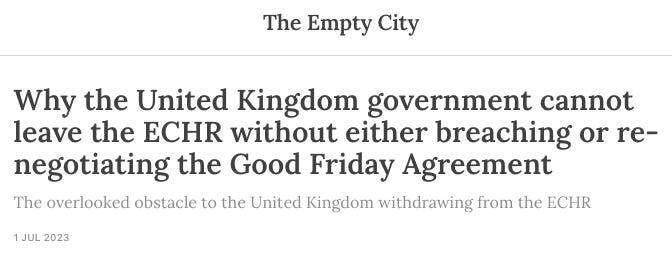Ireland applies to challenge United Kingdom primary legislation
A little-noticed case was launched on Friday last week at the European Court of Human Rights
Last Friday there was an interesting legal development which barely registered on the news in the United Kingdom.
Here is the key, though anodyne, tweet:
This Tweet in turn linked to this press release, which is worth reading carefully:
*
Followers of this blog-Substack (and of my stuff elsewhere) may recall that the European Convention of Human Rights is integral to the Good Friday Agreement.
This new case again shows the importance with which the government of Ireland regards the convention.
*
From time to time, some politicians and pundits call for the United Kingdom to leave the European Convention of Human Rights.
Rarely, if ever, do these politicians and pundits address the implications of this demand for the Good Friday Agreement - or for relations between the United Kingdom and Ireland generally.
As with Brexit, it seems that certain politicians and pundits do not want to think-through, or at least talk-through, how their stated objective will have an impact on Northern Ireland and on the island of Ireland.
Perhaps they hope any issues will go away; perhaps they are not interested; perhaps they do not care.
But the reason why the convention is integral to the Good Friday Agreement is so that both the nationalists in Northern Ireland and the government of Ireland have the means to enforce basic human rights standards, notwithstanding the parliament in Westminster and the government in Whitehall - or whoever has power in Stormont.
*
Now Ireland has launched what is called an “inter-State” case against the United Kingdom. Here is an informative (and fascinating) briefing on such actions.
Such cases are rare. The usual application before the European Court of Human Rights is by an individual against a member state, and not by one member state against another.
But such actions are not unknown.
And in this case, Ireland is targeting not merely an administrative act or practice of the United Kingdom government, but an Act of Parliament - the Northern Ireland Troubles (Legacy and Reconciliation) Act 2023.
Wow.
As such this application brings together in one legal case an array of fundamental matters: the sovereignty of parliament, a challenge to the validity of primary legislation, the scope (and legitimacy) of the convention, cross-border issues on the island of Ireland, and the Troubles (especially the conduct of the police and army).
It is difficult to imagine a more potent mix of politico-legal issues.
And if - if -the Strasbourg Court eventually holds that the United Kingdom has breached the convention with such primary legislation, the political consequences may be profound and will certainly be controversial.
The European Court of Human Rights cannot, of course, quash an Act of Parliament. The Act will still stand even with an adverse judgment, and it will have full force and effect. (This is not like the European Union courts invalidating domestic legislation.)
But the United Kingdom government would be expected, it loses the case, to take remedial action. This will not go down well.
The application cannot be expected to be fully heard before the next election in the United Kingdom. Looking at the list of other inter-State cases there seems to be a three- to four-year period from lodging an application to judgment.
And so, unless the legislation is repealed or amended, or Ireland withdraws the case, this may be more an actual issue for the next government than a symbolic problem for the current administration.
That said, there is a possibility that before the next election the United Kingdom is formally notified of the case and that it then becomes a political and media issue, maybe a sensation.
For it is not everyday that one country formally challenges the primary legislation of another country.







It is extraordinary to think that any government, with any degree of understanding of those 25 years, would not wait as long again to attempt to undo so much good work and good will that was required to begin move on from it.
There’s a generation of young adults who only know peace - when I was growing up the whole thing looked intractable - to open the door to a blood-soaked past would be beyond irresponsible.
The thought that the insane wing of the government would even consider this constitutional vandalism is enraging, although sadly what we have grown used to. Nothing more than a collection of Daily ’Hate’ headlines to virtue signal their virility! What a sorry state we find ourselves trapped in